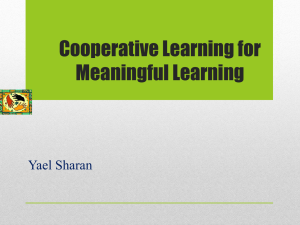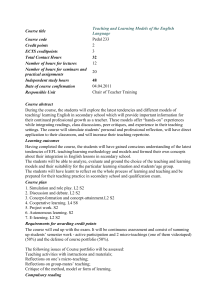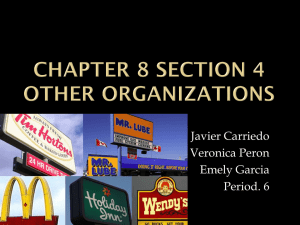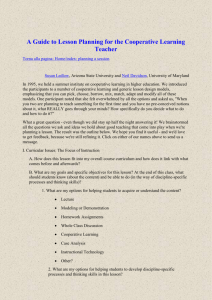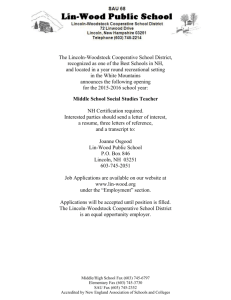Document
advertisement
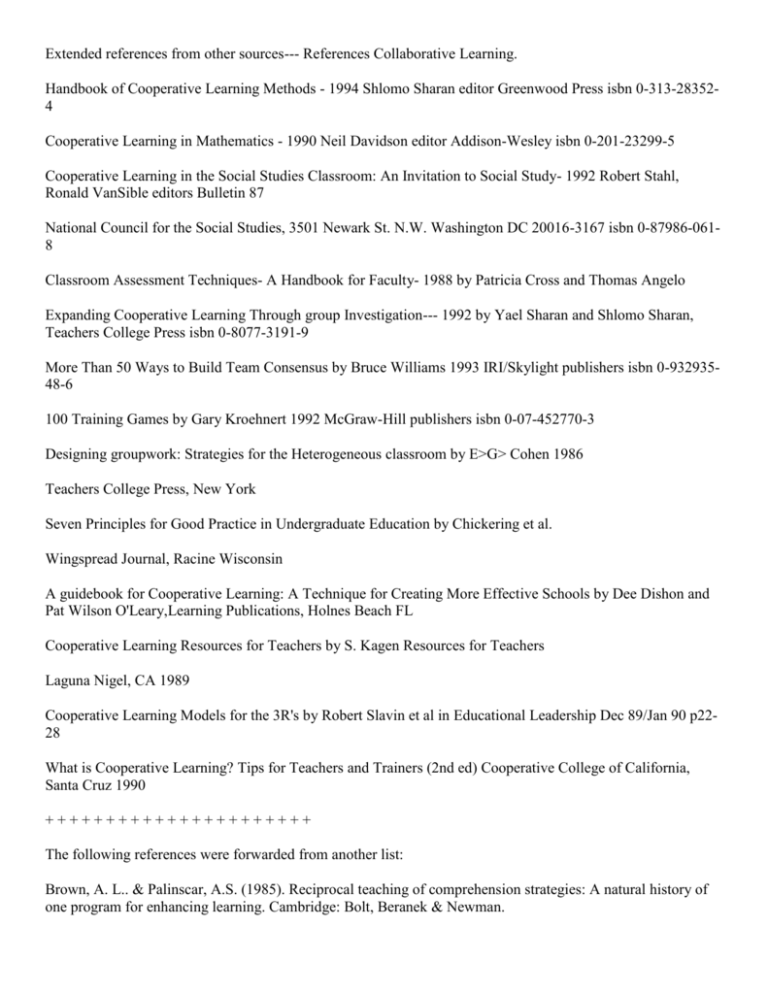
Extended references from other sources--- References Collaborative Learning. Handbook of Cooperative Learning Methods - 1994 Shlomo Sharan editor Greenwood Press isbn 0-313-283524 Cooperative Learning in Mathematics - 1990 Neil Davidson editor Addison-Wesley isbn 0-201-23299-5 Cooperative Learning in the Social Studies Classroom: An Invitation to Social Study- 1992 Robert Stahl, Ronald VanSible editors Bulletin 87 National Council for the Social Studies, 3501 Newark St. N.W. Washington DC 20016-3167 isbn 0-87986-0618 Classroom Assessment Techniques- A Handbook for Faculty- 1988 by Patricia Cross and Thomas Angelo Expanding Cooperative Learning Through group Investigation--- 1992 by Yael Sharan and Shlomo Sharan, Teachers College Press isbn 0-8077-3191-9 More Than 50 Ways to Build Team Consensus by Bruce Williams 1993 IRI/Skylight publishers isbn 0-93293548-6 100 Training Games by Gary Kroehnert 1992 McGraw-Hill publishers isbn 0-07-452770-3 Designing groupwork: Strategies for the Heterogeneous classroom by E>G> Cohen 1986 Teachers College Press, New York Seven Principles for Good Practice in Undergraduate Education by Chickering et al. Wingspread Journal, Racine Wisconsin A guidebook for Cooperative Learning: A Technique for Creating More Effective Schools by Dee Dishon and Pat Wilson O'Leary,Learning Publications, Holnes Beach FL Cooperative Learning Resources for Teachers by S. Kagen Resources for Teachers Laguna Nigel, CA 1989 Cooperative Learning Models for the 3R's by Robert Slavin et al in Educational Leadership Dec 89/Jan 90 p2228 What is Cooperative Learning? Tips for Teachers and Trainers (2nd ed) Cooperative College of California, Santa Cruz 1990 ++++++++++++++++++++++ The following references were forwarded from another list: Brown, A. L.. & Palinscar, A.S. (1985). Reciprocal teaching of comprehension strategies: A natural history of one program for enhancing learning. Cambridge: Bolt, Beranek & Newman. Bruffee, K. (1984). Collaborative Learning and the 'Conversation of Mankind', College English, 46, 635-52 Bruffee, K. (1986). Social Construction, Language, and the Authority of Knowledge: A Bibliographic Essay, College English, 48, 773-90. Clark, D. C. High risk teaching. (0ct. 1994). The Teaching Professor, pp 1-2. (This one will blow the minds of the more conservative folks.) Forman, S. (Fall-winter 1992). Is cooperative learning for you? Mathematics in College, 3-14. Fullilove, R. E. & Treisman, P. U. (1990). Mathematics achievement among African-American undergraduates at the University of California-Berkeley: An evaluation of the mathematics workshop program. Journal of Negro Education, 59(3), 463-477. Garland, M. (Spring 1993). The mathematics workshop model: An interivew with Uri Treisman. Journal of Developmental Education. 16(3), 14-22. Goodsell, A. , Mather, M. & Tinto, V. (1992). Collaborative Learning: A Sourcebook for Higher Education. University College, Pa: National Center on Postsecondary Teaching Learning & Assessment (NCTLA) Hartman, H. J. (199 ?). Reciprocal teaching in reading and beyond.. Journal of Developmental Education. Hartman, H. (1995) Cooperative learning approaches to mathematics problem solving. In A. S. Postamentier (Ed.) the Art of Problem Solving: A Resource for the Mathematics Teacher. New York: Kraus Insternational Publications. Johnson, D. W. , Johnson, R. T., and Smith, K, A. Cooperative Learning: Increasing College Faculty Instructional Productivity. ASHE-ERIC Higher Education Report No. 91, Washington, D.C.: Association for the Study of Higher Education, 1991. Kadel, S. Keehner, J. A. Collaborative Learning: A Sourcebook for Higher Education, Vol.2. University Park, PA.: NCTLA, 19 What Works? Building Effective Collaborative Learning Strategies (Reference Notebook.) University Park, PA.: NCTLA, 19 Palinscar, A.S. & Brown, A. L. (1986), Interactive teaching to promote independent learning from text. Reading Teacher, 39(1), 771-777. Palinscar, A.S., Ransom, K. & Derber, S. (1988-1989). Collaborative research and development of reciprocal teaching. Educational Leadership, 46(4), 37-40.` Tinto, V. & Others. Building learning communities for New College Students. (Research Papers.) University Park, PA.: NCTLA, 19 Triesman, U. (1992). Studying students studying calculus: A look at the lives of minority mathematics students in college. College Mathematics Journal,23. 362-372. ++++++++++++++++++++++++++++++++++++++++++++++++++ Collaborative Learning in Management Education: Issues, benefits, problems and solutions: A literature review Bibliography Author : David Kimber Royal Melbourne Institute of Technology University Adams, J. Q., Welsch, Janice R. (eds.) 1992, Multicultural education: Strategies for implementation in colleges and universities, Volume 2, Western Illinois University, Macomb.(ERIC Document Reproduction No. ED351921). Andrews, Sharon Vincz, 1992, 'Enhancing learning and scholarship in the college classroom: The role of learning teams'. Paper presented at the Annual Meeting of the American Association of Colleges for Teacher Education (San Antonio, TX, February 25-28, 1992). Astin, A. W. 1977, Four critical years: Effects of college on beliefs, attitudes and knowledge, San Francisco: Jossey-Bass. Barratt, Leslie B. 1992, 'Cooperative learning in the college classroom', Contemporary Education. 63(3). pp. 201-202. Barry, D. 1988, 'Twincorp: Extensions of the classroom-as-organisation model', Exchange: The Organisational Behaviour Teaching Journal. Beckman, Mary 1990, 'Collaborative learning: Preparation for the workplace and democracy?', College Teaching, 38(4), pp. 128-133. Benson, Malcolm 1989, 'The academic listening task: A case study', TESOL Quarterly, 23(3), pp. 421 445. Bigelow, J. 1983, 'Teaching action skills: A report from the classroom', Exchange: The Organisational Behaviour Teaching Journal, VIII(2). Bligh, D. A. 1972, What's the use of lectures, Harmondsworth, England: Penguin. Bloom, B. S. (ed) 1956, Taxonomy of Educational Objectives, New York: McKay. Borresen, C. Robert 1990, 'Success in introductory statistics with small groups', College Teaching, 38(1), pp. 26-28. Bowen, Donald D., Jackson Conrad N. 1985-1986, 'Curing those ol' 'omigod not another group class' blues',Organisational Behaviour Teaching Review, 10(4), pp. 21-31. Bridges, Edwin M. 1992, 'Problem based learning for administrators', ERIC Clearinghouse on EducationalManagement, Eugene, Oregon. Bruffee K. A. 1973. 'Collaborative learning: Some practical models'. College English, 34(5) pp. 634 643. Bruffee K. A. 1981. 'Collaborative learning', College English, 43(7) pp. 745-747. Bruffee K. A. 1987, 'The Art of collaborative learning', Change, 19 (March/April) pp. 42-47. Burke, Richard R. 1989,' Learning cooperative learning through cooperative learning in a college mastery learning format', Paper presented at the Annual Meeting of the Midwest Association for Teachers of EducationalPsychology, Oxford (Ohio), October, 1989. Byrne, John A. 1991, 'Wharton rewrites the book on B-schools', Business Week, (3213), p. 43. Carroll, E. Ruth 1991, 'Improved interpersonal relationships: A result of group learning', Journal of Business and Technical Communication, 5(3), pp. 285-299. Cohen, A.R. 1976, 'Beyond simulation: treating the classroom as an organisation', The Organisational Behaviour Teaching Journal, II(I), pp. 13-19. Collier, G. (ed.) 1983, The Management of peer-group learning: Syndicate methods in higher education, Guildford: SRHE. Collier, G., Clarke, R. 1986, 'Syndicate methods: Two styles compared', Higher Education (Neth), 15(6), pp. 609-618. Cooper, J. L. et al. 1990, Cooperative learning and college instruction: Effective use of student learning teams, California State University, Long Beach. Office of the Chancellor. (ERIC Document Reproduction No. ED348920). Cooper, J. L. and Mueck, R. 1989, 'Cooperative/collaborative learning: Research and practise (primarily) at theCollegiate level', Journal of Staff, Program and Organisational Development 7 (3) pp 143-148. Cooper, J. L. et al. 1991, 'Cooperative/collaborative learning: Part II', Journal of Staff, Program and Organisation Development, 9 (4) pp. 239-252. 'Cooperative learning for students from diverse language backgrounds', ERIC Digest, ERIC Clearinghouse on Languages and Linguistics, Washington, D.C. (ERIC Document Reproduction No. ED347853). Crawford, Jane 1988, 'Autonomy within the AMEP', Prospect, 3(2), pp. 175-183. Crow M. L. 1980, 'Teaching as an interactive process'. In Improving teaching styles, (ed.) Eble K. E. JosseyBass, San Francisco. Dansereau, D. F. 1983, 'Cooperative learning: Impact on acquisition of knowledge and skills', Technical report 586. (ERIC Document Reproduction No. ED243 088). de Vries et al, 1989, 'Dutch Comparisons: Cognitive and motivational effects of problem-based learning on medical students', in de Vries et al (eds.) New Directions for Medical Education, New York: Springer-Verlag, pp 231-238. Duckwall, J. M. et al. 1990, 'An assessment of the Student Partnership Program at the University of MissouriKansas City School of Medicine', Academic Medicine, 65(11), pp. 697-701. Feichter, S. B., Davies, E. A. 1984-1985, 'Why some groups fail: A survey of students' experiences with learning groups', The Organisational Behaviour Teaching Review, 9(4), pp. 58-71. Forehand, G. et al. 1976, Conditions and processes of effective school desegregation, Final Report, US. Office of Education, Princeton NJ. Educational Testing Service. Foster, Stephen F., Gilbert, Alan 1991, 'Experiences with problem based learning in management and economics', in Boud, David, Feletti, Grahame (eds.), The challenge of problem based learning, Kogan Page, London. Gabbert, Barbara, Johnson, David W., Johnson, Robert T. 1986, 'Cooperative learning, group-to-individual transfer, process gain, and the acquisition of cognitive reasoning strategies', Journal of Psychology. 120(3), pp. 265-278. Harrison, J. Kline, 1992, 'Individual and combined effects of behaviour modelling in cross-cultural managementtraining', Journal of Applied Psychology, 77(6), pp.952-962. Higginson, Thomas J. and Waxler, Robert P. 1992, 'Business schools and a management exercise approach to learning', Bulletin of the Association for Business Communication, 55 (1), pp. 47-50. Johnson, David W. and others 1991, 'Cooperative learning: Increasing college faculty instructional productivity', ASHE-ERIC Higher Education Report No. 4, 1991. Association for the Study of Higher Education, ERIC Clearinghouse on Higher Education, Washington, D.C. Johnson, David W., Johnson, Roger, Maruyama, Geoffrey and others 1981, 'Effects of cooperative, competitive and individualistic goal structures on achievement: a meta-analysis', Psychology Bulletin, 89, pp. 47-62. Johnson, David, W., Johnson, Roger, T. 1992, 'Implementing cooperative learning', Contemporary Education, 63(3), pp. 173-180. Kulik, J. A. and Kulik, C. L. 1979, 'College Teaching', in Peterson and Walberg (eds), Research on Teaching: Concepts, findings and implications. Berkeley, CA: McCutcheon. Learn by DU-ing. What's wrong with the TEAMS approach?, Drexel University, Philadelphia, PA, Economics Dept., 1992. (ERIC Document reproduction No. ED352867). Lee, llona 1988, 'Cross cultural training techniques', Conference Coordinating Comrnittee (SA), proceedings of the Third national conference of the Network for Intercultural Communication, Adelaide: Network for Intercultural Communication, pp.29-31. Loeher, Larry and others, 'TA at UCLA/Newsletter', Issues No. 9, 1982; No. 10, 1983; No. ll, 1983, California University, Los Angeles. Lyons, Paul R. [1990], Implementing Cooperative Learning Methods. (Eric document). Marton, F. and Saljo, R 1976, 'On qualitative differences in Learning I and II: Outcome and process', British Journal of Educational Research, 46. McKeachie, W. J. et al. 1987, Teaching and learning in the college classroom: A review of the research literature. Ann Arbour: University of Michigan, NCRIPTAL. McKeachie, W. J. et al. 1988, 'Teaching thinking', NCRIPTAL Update 2(1) p. 1. Millis, Barbara J. 1991, 'Enhancing adult learning through cooperative small groups', Continuing Higher Education Review, 55(3), pp. 144-154. Nelson, Donald R., Obremski, Tom E. 1990, 'Promoting moral growth through itra-group participation', Journal of Business Ethics, 9(9), pp. 731-739. Neer, M. R. 1987, 'The development of an instrument to measure classroom comprehension', Communication Education, 36, pp. 154-166. Newble, D. and Jaeger, K. 1983, 'The effect of assessments and examination on the learning of medical students', Medical Education, 17: 165. Owen, G 1983, 'The Tutors role', in Collier (ed.) Management of Peer-Group Learning. Petonito, Gina 1991, 'Fostering peer learning in the college classroom', Teaching Sociology, 19(4), pp. 498-501. Pike, Beth N. 1992, An ethnographic action research study: Undergraduate adult learners' perspective on the learning process (small groups), EDD thesis, University of Missouri- Saint Louis, 287 pages. Porter, L. and McKibbin, L. 1988, Management Eduction and Development: Drift or Thrust into the 2Ist Century, New York, McGraw Hill. Romm, Tsilia, Mahler, Sophia 1991, 'The Case study challenge: a new approach to an old method', Management Education and Development, 22(4), pp. 292-301. Schneller, R. 1989, 'Intercultural and interpersonal processes and factors of misunderstanding: Implications for multicultural training', International Journal of Intercultural Relations, 13(4), pp. 465-484. Sheridan, Jean, Byrne Anne C. and Quina, Kathryn 1989, 'Collaborative learning: Notes from the field', College Teaching, 37(2), pp. 49-53. Sims, Ronald R., Sims, Serbrenia J. 1991, 'Increasing applied business ethics courses in business school curricula'. Journal of Business Ethics, 10(3), pp.211-219. Slavin, R. E. 1980, 'Cooperative learning', Review of Educational Research 50 (2) pp. 315-342. Slavin, R. E. et al., 1985, Learning to cooperate, cooperating to learn, New York: Plenum. Slavin, R. E. 1987, Cooperative learning: Student teams, (2nd ed.) Washington DC: National Education Association. Slavin, R. E. 1988, 'Cooperative learning and student achievement', Educational Leadership 46 (2) pp. 31-33. Smith, D. G. 1977, 'College classroom interactions and critical thinking', Journal of Educational Psychology, 69, 180-190. Smith, D. G. 1980, 'Instruction and outcomes in an undergraduate setting', presented at Annual Meeting of the American Educational Research Association, Boston. Stinson, John E. 1990, 'Integrated contextual learning: situated learning in the business profession', Paper presented at the Annual Meeting of the American Educational Research Association, Boston, MA, April 16-20, 1990. Tinto, V. 1987, Leaving college: Rethinking the causes and cures for student attrition, Chicago, University of Chicago Press. Tubbs, S. L. 1985, 'Consulting teams: A methodology for teaching integrated management skills', Exchange: The Organisational Behaviour Teaching Journal, lX(4), pp. 52-57. Usher, John R., Simmonds, David G., Earl, Shirley E. 1991, 'Industrial enhancement through problem-based learning', in Boud, David, Feletti, Grahame (eds.), Challenge of problem based learning, Kogan Page Ltd., London. Van Steeberg, V., Gillette, J. H. 1985, 'Teaching group dynamics with a group-on-group design', Exchange: The Organisational Behaviour Teaching Journal. Wagenheim, Gary, 1992, TEAMS. Team Exercise for Action Management Skills: A Semester-Long TeamManagement Simulation. (ERIC Document Reproduction No. ED351756). Wales, C. E. and Sager, R. 1978, The Guided design approach, Englewood Cliffs, NJ: Educational Technology Publications. Wagner, L.1982, Peer Teaching: Historical Perspectives, London: Greenwood Press. Wagner, Richard J. et al., 1992, 'Enhancing teaching effectiveness using experiential techniques: Model development and empirical evaluation'. Paper presented at the Annual Meeting of the Midwest Region of the Academy of Management (St. Charles, IL, April 22-25, 1992). Weiner, H. S. 1986, 'Collaborative Learning in the classroom', College English, 48 (1) pp. 52-61. Whipple, B. 1986, Cue News 2:2. Whitman, Neal A., Fife, Jonathon D. (ed.) 1988, 'Peer teaching: To teach is to learn twice', ASHE-ERIC Higher Education Report No. 4, Association for the Study of Higher Education, 7 ERIC Clearinghouse on Higher Education, Washington, D.C. Winsor, Keith 1991, 'Applying problem-based learning to teaching the practice of law', in Boud, David, Feletti, Grahame (eds.), Challenge of problem based learning, Kogan Page Ltd., London. About the author David Kimber Associate Professor (Business Education) Department of Accountancy Faculty of Business RMIT GPO box 2476V Melbourne 3001 ++++++++++++++++++++++++++++++++++++++++++ Improving Student Learning with Group Assignments David McDonald Lake Superior State University References 1.Hammer, M. and Champy J.; Reengineering The Corporation: A Manifesto For Business Revolution; HarperCollins Publishers; 1994. 2.``Firm (Motorola) gives workers say in pay;'' The Toronto Star, Friday, November 25, 1994. 3.ASEE Project Report, ``Engineering Education for a Changing World,'' ASEE Prism, V4, N4, December, 1994. 4.Wankat, P.C. and Oreovicz, F.S., ``A Different Way Of Teaching,'' ASEE Prism, V3, N5, January, 1994. 5.``Learning Through Cooperation'' article by Vincent Ercolano, ASEE Prism, V4, N3, November, 1994. 6.Johnson, D.W., Johnson, R.T., and Smith K.A., Cooperative Learning: Increasing College Faculty Instructional Productivity, ASHE-ERIC Higher Education Report No. 4, Washington, DC: The George Washington University, School of Education and Human Development. 7.Stearns, S.A., ``Steps for Active Learning of Complex Concepts,'' College Teaching, V42, N3, Summer 1994, Pgs 107-108. 8.Smith, K.A.; ``Cooperative Learning: Effective Teamwork for Engineering Classrooms;'' Joint Newsletter of the IEEE Education Society and ASEE Electrical Engineering Division; April, 1995. 9.McDonald, D., ``Group Projects in Electrical Engineering Technology,'' ASEE North Midwest Section Conference Proceedings, Duluth, 1994. 10.McDonald, D. and Niemi, A., National Science Foundation Instrumentation and Laboratory Improvement Grant, Active Learning: Group Design Projects, DUE 9351807. 11.McDonald, D., ``A Team Design Approach for Control Systems Student Training,'' Instrument Society of America, International Conference Proceedings, Toronto, 1995. ++++++++++++++++++++++++++++++++++++++++++++ Notes on Cooperative Learning Frederick Mosteller, Marjorie Olson, and Cleo Youtz Center for Evaluation, Initiatives for Children American Academy of Arts and Sciences April 10, 1996 REFERENCES 1.Artzt, A.F. (1983). The Comparative Effects of the Student- Team Method of Instruction and the Traditional Teacher- Centered Method of Instruction upon Student Achievement, Attitude, and Social Interaction in High School Mathematics Courses. Doctoral dissertation, New York University. 2.Johnson, L.C. (1985). The Effects of the Groups of Four Cooperative Learning Models on Student ProblemSolving Achievement in Mathematics. Doctoral dissertation, University of Houston. 3.Mosteller, F. (1995). The Tennessee Study of Class Size in the Early School Grades. The Future of Children, Vol. 5, No. 2, pp. 113-127. 4.Mosteller, F.; R. Light, and J. Sachs (Submitted for publication). Sustained Inquiry in Education: Learning from Ability Grouping and Class Size. 5.Slavin, R.E. (1995). Cooperative Learning, second edition. Needham Heights, MA: Allyn & Bacon. 6.Slavin, R.E.; and N.L. Karweit (1981). Cognitive and Affective Outcomes of an Intensive Student Team Learning Experience. Journal of Experimental Education, Vol. 50, pp. 29- 35. 7.Slavin, R.E.; and N.L. Karweit (1984). Mastery Learning and Student Teams: A Factorial Experiment in Urban General Mathematics Classes. American Educational Research Journal, Vol. 21, pp. 725-736. 8.Slavin, R.E.; M.B. Leavey, and N.A. Madden (1984). Combining Cooperative Learning and Individualized Instruction: Effects on Student Mathematics Achievement, Attitudes, and Behaviors. The Elementary School Journal, Vol. 84, pp. 409-422. 9.Slavin, R.E.; N.A. Madden, and M. Leavey (1984). Effects of Team Assisted Individualization on the Mathematics Achievement of Academically Handicapped and Nonhandicapped Students. Journal of Educational Psychology, Vol. 76, pp. 813-819. 10.Stevens, R.J.; and R.E. Slavin (1995). The Cooperative Elementary School: Effects on Students'Achievement, Attitudes, and Social Relations. American Educational Research Journal, Vol. 32, pp.321-351. 11.Stevens, R.J.; and R.E. Slavin (1995). Effects of a Cooperative Learning Approach in Reading and Writing on Academically Handicapped and Nonhandicapped Students. The Elementary School Journal, Vol. 95, pp. 241-262. 12.Stevens, R.J.; and S. Durkin (1992). Using Student Team Reading and Student Team Writing in Middle Schools: Two Evaluations. Baltimore, MD: Johns Hopkins University, Center for Research on Effective Schooling for Disadvantaged Students, Report No. 36. 13.Stevens, R.J.; R.E. Slavin, and A.M. Farnish (1991). The Effects of Cooperative Learning and Direct Instruction in Reading Comprehension Strategies on Main Idea Identification. Journal of Educational Psychology, Vol. 83, pp. 8-16. 14.Stevens, R.J.; N.A. Madden, R.E. Slavin, and A.M. Farnish (1987). Cooperative Integrated Reading and Composition: Two Field Experiments. Reading Research Quarterly, Vol. 22, pp. 433-454. +++++++++++++++++++++++++++++++++++++++++++ Should We Use Cooperative Learning in College Chemistry? http://tigerched.clemson.edu/cooplearn/paper.html References .Halyard, R.A. "Making Decisions About College Science Teaching: What Am I Going to Do?" Journal of College Science Teaching, 23, 79-81. Lazarowitz, R.; Hertz-Lazarowitz, R.; Baird J. H. "Learning Science in a Cooperative Setting: Academic Achievement and Affective Outcomes." Journal of Research in Science Teaching, 31, 1121-1131. Okebukola, P.A. "The Relative Effectiveness of Cooperative and Competitive Interaction Techniques in Strengthening Students' Performance in Science Classes." Science Education, 69 (4), 501-509. .Okebukola, P.A. "Cooperative Learning and Students Attitudes to Laboratory Work." School Science and Mathematics, 86(7), 582-590. Okebukola, P.A.; Ogunniyi, M.B. "Cooperative, Competitive, and Individualistic Science Laboratory Interaction Patterns - Effects on Students' Achievement and Acquisition of Practical Skills." Journal of Research in Science Teaching, 21, 875-884. Tingle, J.B.; Good, R. "Effects of Cooperative Grouping on Stoichiometric Problem Solving in High School Chemistry." Journal of Research in Science Teaching, 27 , 671-683. .Heller, P.; Keith, R.; Anderson, S. "Teaching Problem Solving Through Cooperative Grouping. Part 1: Group versus Individual Problem Solving." American Journal of Physics, 60, 627-636. Caprio, M. W. "Cooperative Learning-The Jewel Among Motivational-Teaching Techniques." Journal of College Science Teaching, 22, 279-281. Pence, H. E. "Combining Cooperative Learning and Multimedia in General Chemistry." Education, 113, 375380. Cooper, M. M. "Cooperative Learning: An Approach for Large Enrollment Courses." Journal of Chemical Education, 72, 162-164. Bier, J. "Realizations of a Chemistry Educator." Journal of College Science Teaching, 22, 291-294. Smith, M. E.; Hinckley, C.C.; and Volk, G.L. "Cooperative Learning in the Undergraduate Laboratory." Journal of Chemical Education, 68, 413-415. Cooper, M. M. "Cooperative Chemistry Laboratories." Journal of Chemical Education, 71, 307. Cooper, M.M. "Cooperative Chemistry Laboratories." Cooperative Learning Magazine, 13, 37. Aronson, E., Blaney, N., Stephan,C., Sikes, J., and Snapp, M. The Jigsaw Classroom. Sage: Beverly Hills, CA, 1978. ++++++++++++++++++++++++++++++++++++++++++++++++++++++++++++++++++++++++++ Reading List for Cooperative Learning Andrini, Beth. Cooperative Learning & Mathematics: A Multi-Structural Approach. San Juan Capistrano, CA: Kagan Cooperative Learning, 1991. Aronson, Elliot., et al. The Jigsaw Classroom. Beverly Hills, CA: Sage, 1978. Artzt, Alice F. and Claire M. Newman. How to Use Cooperative Learning in the Mathematics Class. Reston, VA: National Council of Teachers of Mathematics, 1990. Hassard, Jack. Science Experiences: Cooperative Learning and the Teaching of Science. Menlo Park, CA: Addison-Wesley, 1990. _________. Minds on Science: Middle and Secondary School Methods. New York: HarperCollins, 1992. Sharan, Shlomo, and Shachar, Hana. Language and Learning in the Cooperative Classroom. New York: Springer-Verlag, 1988. +++++++++++++++++++++++++++++++++++++++++ COOPERATIVE LEARNING IN POST SECONDARY EDUCATION: IMPLICATIONS FROM SOCIAL PSYCHOLOGY FOR ACTIVE LEARNING EXPERIENCES A presentation to the annual meetings of the American Educational Research Association, Chicago, IL, April 3-7, 1991. [revised, 20 January, 1996 Lawrence W. Sherman, Professor Department of Educational Psychology, Center for Human Development, Learning and Teaching,CHDLT School of Education and Allied Professions,(SEAP) Miami University, Oxford, Ohio 45056, E-MAIL: LS8CEDPF @ MIAMIU.MUOHIO.EDU FAX: [513] 529-3646 VOICE PHONE: (513)-529-6642. URL: http://miavx1.muohio.edu/~shermal +++++++++++++++++++++++++++++++ REFERENCES Abercrombie, M. L. (1974). Aims and Techniques of Group Teaching. London: Society for Research into Higher Education Ltd. Aronson, E., Blaney, N., Sikes, J., Stephan, G., & Snapp, M. (1978). The Jigsaw Classroom. Beverly Hills, CA: Sage Publication. Aronson, E., Blaney, N., Sikes, J., Stephan, G., & Snapp, M. (1975). The jigsaw route to learning and liking. Psychology Today, July, 1975, 43-59. Bar-Tal, D., & Saxe, L. (eds). (1978). Social Psychology of Education: Theory and Research. New York: John Wiley & Sons. Baxter-Magolda, M. B., & Rogers, J. L. (1988). Peer Tutoring: Collaborating to enhance intellectual development. College Student Journal, 288-296. Billson, J. M. (1986). The college classroom as a small group: Some implications for teaching and learning. Teaching Sociology, 14, 143-151. Blaney, N. J., Stephan, S. Rosenfield, D., Aronson, E., & Sikes, J. (1977). Interdependence in the classroom: A field study. Journal of Educational Psychology, 69, 121-128. Bohlmeyer, E. M., & Burke, J. J. (1987). Selecting cooperative learning techniques: A consultative strategy guide. School Psychology Review, 16, 36-49. Bouton, C. & Garth, R. (Eds.). (1983). Learning in groups. San Francisco: Jossey-Bass. Brody, C. M., (1995). Collaborative or cooperative learning? Complimentary practices for instructional reform. Journal of Staff, Program & Organizational Development, 12(3) 133-143. Bruffee, K. A. (1985). A Short course in writing. Boston: Little, Brown. Bruffee, K. A. (1988). On not listening in order to hear: Collaborative learning and the rewards of classroom research. Journal of basic Writing 7(1), Spring, 1988, 3-12. Bruffee, K. A. (1993). Collaborative Learning: Higher Education, Interdependence, and the Authority of Knowledge, Baltimore: The Johns Hopkins University Press, pp 1-240. Carroll, D. (1986). Use of the jigsaw technique in laboratory and discussion classes. Teaching of Psychology, 13, 4, 208-210. Collier, G. (Ed.). (1983). The management of peer-group learning: Syndicate methods in higher education. Guildford, Surrey: Society for Research into Higher Education Ltd. Cooper, J., & Mueck, R. (1989). Student involvement in learning: Cooperative learning and college instruction. First Annual Lilly West Conference. Cooper, J. L., Sanchez, P., Prescott, S., & Lawrence, T. (1988) . Cooperative learning and college instruction: Part II. A paper presentation to the Western Psychological Association, Dansereau, D. F. (1985). Learning strategy research. In J. W. Segal, S. F. Chipman, & R. Glaser (Eds.), Thinking and learning skills: Vol. 1, Relating instruction to research. Hillsdale, NJ: Erlbaum. Dansereau, D. F. (1986b). Dyadic and cooperative learning and performance strategies. Paper presented at the annual meeting of the American Educational Research Association, San Francisco. Dansereau, D. F. (1987). Transfer from cooperative to individual studying. Journal of Reading, April, 1987, 614-618. Dansereau, D. F., Hythecker, V. I., O'Donnell, A., Young, M. D., Lambiotte, J. G., & Rocklin, T. R.(1986). Technical Training: An application of a strategy for learning structural and functional information. Contemporary Educational Psychology 11, 217-228. Dembo, M. H. (1994). Applying Educational Psychology in the Classroom (4th edition). New York: Longman. Deutsch, M. (1949). A theory of cooperation and competition. Human Relations, 2, 129-152. Deutsch, M. (1962). Cooperation and trust: Some theoretical notes. In M. R. Jones (editor), Nebraska Symposium on Motivation. Lincoln, NB: Nebraska Press, pp 275-319. DiPardo, A., Warshauer-Freedman, S. (1988). Peer response groups in the writing classroom: Theoretic foundations and new directions. Review of Educational Research,58, 119-149. Educational Leadership. (1987). Brandt, R. S., Executive Editor. Journal of the Association for Supervision and Curriculum Development. 45(3), 4-75. Educational Leadership, (1989). Slavin, R. E., Guest Editor. Journal of the Association for Supervision and Curriculum Development. 47(4), 4-66. Ellis, S. (1985). Introducing cooperative learning groups: A district-wide effort. Journal of Staff Development, 6(21), 52-59. Fantuzzo, J. W., Dimeff, L. A., & Fox, S. L. (1989). Reciprocal peer tutoring: A multimodal assessment of effectiveness with college students. Teaching of Psychology,16(3), 133-135. Fantuzzo, J. W., Riggio, R. E., Connelly, S., & Dimeff, L. A. (1989). Effects of reciprocal peer tutoring on academic achievement and psychological adjustment: A component analysis. Journal of Educational Psychology. 81(2), 173-177. Feichtner, S. B., & Davis, E. A. (1984-5). Why some groups fail: A survey of students' experiences with learning groups. The Organizational Behavior Teaching Review,9(4), 58-71. Feichtner, S. B., & Michaelsen, L. K. (1984). Giving students a part in the process: An innovative approach to team learning. College Student Journal, 18, 335-344. Feldman, R. S. (Ed.). (1986). The social psychology of education: Current research and theory. Cambridge: Cambridge University Press. Fraser, S. C., Diener, E., Beaman, A. L., & Kelem, R. T. (1977). Two, three, or four heads are better than one: Modification of college performance by peer monitoring. Journal of Educational Psychology, 69, 101-108. Gere, A. R. (1987). Writing groups: History, theory and implications. Carbondale: Southern Illinois University Press. Glover, J. A., & Bruning, R. H. (1990). Educational Psychology: Principles and Applications (2ndedition). Boston: Little, Brown. Gnagey, W. (1988). STAD in educational psychology. A paper presentation to the Mid-western Educational Research Association meetings. Chicago, IL: October, 1988. Good, J. M., Still, A., & Valenti, S. (1989). Culture and the mediation of human affordances: An introduction to the symposium "Social Affordances and Interaction." Fifth International Conference on Event Perception and Action. Oxford, OH: Miami University. Good, T. L.,& Brophy, J. E. (1990). Educational Psychology (3rd edition). New York: Longman. Goodsell, A., Maher, M., Tinto, V., Smith, L., & MacGregor, J. (1992): Collaborative Learning: A Sourcebook for higher education. University Park, PA: National Center on Postsecondary Teaching, Learning & Assessment. Hains, D. B., & McKeachie, W. J. (1967). Cooperative versus competitive discussion methods in teaching introductory psychology. Journal of Educational Psychology, 58, 386-90. Hall, R. H., Rocklin, T. R., Dansereau, D. F., Skaggs, L. P., O'Donnell, A. M., Lambiotte, J. G. & Young, M. D. (1988). The role of individual differences in the cooperative learning of technical material. Journal of Educational Psychology, 80(2), 172-178. Hanson, P. G. (1981). Learning through groups: A trainer's basic guide. San Diego, CA: University Associates. Hawkins, T. (1976). Group inquiry techniques for teaching writing. Urbana, IL: ERIC Clearinghous on Reading and Communication Skills and National Council of Teachers of English. ERIC DOCUMENT ED 128-813. Hewstone, M., & Brown, R. (editors). (1986). Contact and Conflict in Intergroup Encounters. New York: Basil Blackwell. Hillocks, G., Jr. (1984). What works in teaching composition: A meta-analysis of experimental treatment studies. American Journal of Education. 93, 133-170. Johnson, D. W., & Johnson, R. T. (1984). Cooperation in the classroom. Edina, Minnesota: Interaction Book Company. Johnson, D. W., & Johnson, R. T. Learning together and alone: Cooperative, competitive, and individualistic learning (2nd ed.). Englewood Cliffs, New Jersey: Prentice-Hall. Johnson, D. W. & Johnson, R. J. (1975). Learning together and alone. Englewood Cliffs, NJ: Prentice-Hall. Johnson, D. W., & Johnson, F. P. (1987). Joining together: Group theory and group skills (3rd edition). Englewood Cliffs, NJ: Prentice-Hall. Johnson, D. W. & Johnson, R. T. (1987). Research Shows the benefits of adult cooperation. Educational Leadership, 45, 3, 27-30. Johnson, D. W. & Johnson, R. T. A meta-analysis of cooperative, competitive, and individualistic goal structures. Hillsdale, NJ: Lawrence Erlbaum, (in press) Johnson, D. W., Johnson, R. T., & Smith, K. A. (1986). Academic conflict among students: Controversy and learning. In R. S. Feldman (Ed.), The social psychology of education: Current research and theory (pp. 199231). Johnson, D. W., Maruyama, G., Johnson, R. T., Nelson, D., & Skon, L.(1981). Effect of cooperative, competitive and individualistic goal structures on achievement: A meta-analysis. Psychological Bulletin, 89, 4762. Johnson, D. W., Johnson, R. T., Holubec, E. J., and Roy, P. (1984). Circles of Learning: Cooperation in the Classroom. Alexandria, VA: Association for Supervision and Curriculum Development. Kagan, S. (1988). Cooperative learning: Resources for Teachers. Riverside, CA: University of California. Kohn, A. (1992). No contest: The case against competition. New York: Houghton Mifflin. Krayer, J. J. (1986). Implementing team learning through participative methods in the classroom. College Student Journal, 20, 157-161. Lamberights, R. (1988). Effects of task interdependence and peer tutoring in original and alternative jigsaw sessions. Paper presentation to the Fourth Convention ofthe International Association for the Study of Cooperation in Education. Kibbutz Shefayim, Israel, July 5-8, 1988. Lambiotte, J. G., Dansereau, D. F., Rocklin, T. R., Fletcher, B., Hythecker, V. I., Larson, C. O., & O'Donnell, A. M.(1987). Cooperative learning and test taking: Transfer of skills, 12, 52-61. Larson, C. O., & Dansereau, D. F. (1986). Cooperative learning in dyads. Journal of Reading, 29, 516- 20. Larson, C. O., Dansereau, D. F., O'Donnell, A. M., Hythecker, V. I., Lambiotte, J. G., & Rocklin, T. R. (1985). Effects of metacognitive and elaborative activity on cooperative learning and transfer, 10, 342-348. Levine, J. M., & Moreland, R. L. (1990). Progress in small group research. Annual Review of Psychology, 41, 585-634. Lippitt, R., Watson, J., & Westley, B. (1958). The dynamics of planned change: A comparative study of principles and techniques. New York: Harcourt & Brace. Lucker, G. W., Rosenfield, D., Sikes, J., & Aronson, E. (1976). Performance in the interdependent classroom: A field study. American Educational Research Journal, 13, 115-123. McDonald, B. A., Larson, C. O. & Dansereau, D. F. (1985). Cooperative dyads: Impact on text learning and transfer. Contemporary Educational Psychology, 10, 369-377. McEnerney, K. (in press). Cooperative learning as a strategy in clinical laboratory science education. Clinical Laboratory Science. Messick, D. M., & Mackie, D. M. (1989). Intergroup relations. Annual Review of Psychology, 40, 45-81. Millis, B. J. (1990). Helping faculty build learning communities through cooperative groups. In L. Hilsen (ed.), To improve the academy: Resources for student faculty, and institutional development, 10, 43-58. Stillwater, OK: New Forums Press. Millis, B. J., Sherman, L. W., & Cottell, P. G. (1993) Stacking the DEC to promote critical thinking: Applications in three disciplines. Cooperative Learning and College Teaching, 3(3), 12-14. Newman, F. M., & Thompson, J. A., (1987). Effects of cooperative learning on achievement in secondary schools: A summary of research. Madison, WI: University of Wisconsin, National Center on Effective Secondary Schools. 30 pp. Radebaugh, M. R. & Kazemek, F. E. (1989). Cooperative learning in college reading and study skills classes. Journal of Reading, 32, 414-418. Rewey, K. L., Dansereau, D. F., Skaggs, L. P., Hall, R. H., & Pitre, U. (1989). Effects of scripted cooperation and knowledge maps on the processing of technical material. Journal of Educational Psychology, 81(4), 604609. Roomer, K. T. (1985). Collaboration: New forms of learning, new ways of thinking. The Forum For Liberal Education 8(2), pp. 3-19. Schmuck, R. A., & Schmuck, P. A. (1992). Group processes in the classroom (6th edition). Dubuque, Iowa: Wm. C. Brown. Sharan, S. (1980). Cooperative learning in small groups: recent methods and effects on achievement, attitudes, and ethnic relations. Review of Educational Research,50, 241-258. Sharan, S. (Editor)(1994). Handbook of cooperative learning methods. Westport, Connecticult: The Greenwood Press. Sharan, R., Sharan, S., Kagan, S. Hertz-Lazarowitz, R., Webb, C., & Schmuck, R. (Eds.). (1985). Learning to cooperate, cooperating to learn. New York: Plenum Press. Sharan, S. & Sharan Y. (1976). Small Group Teaching. Englewood Cliffs, NJ: Educational Technology Publication. 256 pp. Sharan, Y., & Sharan, S. (1987). Training teachers for cooperative learning. Educational Leadership, 45, 3, 2025. Shaw, M. E., Ackerman, B., McCown, N. E., Worsham, A. P., Haugh, L.D., Gebhardt, B. M., & Small, P. A., Jr. (1979). Interaction patterns and facilitation of peer learning. Small Group Behavior, 10, 214-223. Sherman, L. W. (1976). Formative evaluation, mastery grading, and peer directed small group discussions in an introductory educational psychology class. In J. B. Maas & D. A. Kleiber (eds.), Directory of Teaching Innovations in Psychology, Washington, DC: American Psychlogical Association, 445-446. Sherman, L. W. (1979). Computer-managed correspondence in large lecture courses. Paper presentation to Division15 (Educational Psychology), 87th Annual Convention of the American Psychology Association. ERIC DOCEMENT ED 247-698. Sherman, L. W. (1986). Cooperative vs competitive educational psychology classrooms: A comparative study. Teaching and Teacher Education: An International Journal of Research Studies, 2, 3, 283-295. Sherman, L. W. (1988). A comparative study of cooperative and competitive achievement in two secondary biology classrooms: The group investigation model versus an individually competitive goal structure. Journal of Research in Science Teaching 26(1), pp. 55-64. Sherman, L. W. (1988). Cooperative classroom pedagogies in undergraduate education. Paper presentation to the Fourth Convention of the International Association for the Study of Cooperation in Education. Kibbutz Shefayim, Israel, July 5-8, 1988. ERIC DOCUMENT ED 299-873. Sherman, L. W. (1988). A Pedagogical strategy for teaching human development: Dyadic essay confrontations through writing and discussion. Paper presentation to the 8th Annual Lilly Conference on College Teaching. Oxford, Ohio, November, 1988. ERIC DOCUMENT ED 305-629. Sherman, L. W. (1990). A cooperative pedagogical strategy for teaching developmental theories through writing: Dyadic confrontations. Paper presentation to International Convention on Cooperative Learning, Baltimore, Maryland, July 6-10, 1990. ERIC DOCUMENT ED 321-721. Sherman, L. W. (1995). A postmodern, constructivist and cooperative pedagogy for teaching educaional psychology, assisted by computer medidated communications. In J. L. Schnase and E. L. Cunnius (Editors), Proceedings of CSCL '95: The First International Conference on Computer Support for Collaborative Learning. Mahwah, NJ: Lawrence Erlbaum Associates, Inc., pp. 308 - 311. Sherman, L. W. & Woy-Hazelton, S. (1988). The student team project: A long-term cooperative strategy in graduate environmental studies. Paper presentation to the Fourth Convention of the International Association for the Study of Cooperation in Education. Kibbutz Shefayim, Israel, July 5-8, 1988. ERIC DOCUMENT, ED 299-872. Slavin, R. E. (1978a). Student teams and achievement divisions. Journal of Research and development in Education. 12, 39-49. Slavin, R. E. (1978b). Student teams and comparison among equals: Effects on academic performance and student attitudes. Journal of Educational Psychology, 70, 532-538. Slavin, R. E. (1983). When does cooperative learning increase student achievement? Psychological Bulletin, 93, 429-445. Slavin, R. E. (1991). Educational Psychology: Theory into practice (3rd edition). Englewood Cliffs, NJ: Prentice-Hall. Slavin, R. E. (1995). Cooperative Learning: Theory, research, and practice (2nd Edition). Boston: Allyn and Bacon. Slavin, R., Sharan, S., Kagan, S. Hertz-Lazarowitz, R. Webb, C., & Schmuck, R. (Eds.). (1985). Learning to cooperate, cooperating to learn. New York: Plenum Press. Smith, K. A. (1984). Structured controversies. Engineering Education, 74, 306-309. Smith, K. A., Johnson, D. W., & Johnson, R. T. (1981). Structuring learning goals to meet the goals of engineering education. Engineering Education, 72, 221-226. Spear, K. (1988). Sharing writing: Peer response groups in English classes. Portsmouth, NH: Boynton/Cook. Spurlin, J. E., Dansereau, D. F., Larson, C. O., & Brooks, L. W. (1984). Cooperative learning strategies in processing descriptive text: Effects of role and activity level of the learner. Cognition and Instruction, 1(4), 451463. Thompson, J. D. (1967). Organizations in action. New York: McGraw-Hill. Tjosvold, D., & Field, R. H. (1984). Effect of concurrence, controversy and consensus on group decision making. The Journal of Social Psychology, 125, 355-363. Van Oudenhoven, J. P., van Berkum, G., & Swen-Koopmans, T. (1987). Effect of cooperation and shared feedback on spelling achievement. Journal of educational psychology, 79(1), 92-94. Van Oudenhoven, J. P., Wiersema, B., & van Yperen, N. (1987). Effects of cooperation and feedback by fellow-pupils on spelling-achievement. European Journal of Psychology of Education, II(1), 83-91. Webb, N. M., & Kenderski, C. M. (1984). Student interaction and learning in small-group and whole-class settings. In P. L. Peterson, L. C. Wilkinson & M. Hallinan (eds.), The social context of instruction. New York: Academic Press, pp. 153-170. Wiener, H. S. (1986). Collaborative learning in the classroom: A guide to evaluation. College English, 48, 5261. Whipple, W. (1987). Collaborative learning: Recognizing it when we see it. American Association for Higher Education, 40(2), 3-7. Wolff, R. P. (1969). The ideal of the university. Boston: Beacon. ++++++++++++++++++++++++++++++++

